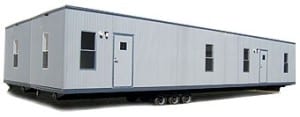
How to Find the Best Deal on Office Trailers for Sale
Office trailers have grown in popularity as a versatile, mobile, and cost-effective solution for businesses requiring temporary or semi-permanent office spaces. Whether it’s for a construction site, a remote research location, or a growing business in need of extra space, an office trailer can be an ideal solution. But how do you ensure you’re getting the best deal when purchasing one? This comprehensive guide will walk you through the process.
Understand Your Needs
Before diving into the world of office trailers, it’s essential to pinpoint exactly what you’re looking for:
- Size Matters: Determine the size of the trailer you need. Consider the number of employees, the type of furniture, and the equipment that will be housed in the trailer.
- Duration of Use: If you only need an office trailer for a short period, consider renting instead of purchasing. However, for longer-term projects, buying might be more cost-effective.
- Features and Amenities: List out any specific features you need, like bathrooms, kitchenettes, conference rooms, or specific tech integrations.
Research, Research, Research
Once you have a clear idea of what you need, it’s time to start your search:
- Online Marketplaces: Websites dedicated to selling and renting office trailers can be a good starting point. They often provide detailed listings with photos, specs, and prices.
- Local Dealers: Check with local dealers or manufacturers who specialize in office trailers. They can offer insights into the best models and might have exclusive deals.
- Reviews and Testimonials: Look for customer reviews and testimonials. They can provide a real-world perspective on the quality, durability, and usability of particular trailer models.

Compare Prices
Price is a significant factor, but it shouldn’t be the only one:
- Get Multiple Quotes: Always request quotes from multiple sellers to compare prices.
- Negotiate: Don’t be afraid to negotiate the price, especially if you’re purchasing more than one unit.
- Watch for Hidden Costs: Ensure the price includes delivery, setup, and any other additional costs. Some sellers might list a base price but add extra fees later.
Inspect Before You Purchase
If possible, always inspect an office trailer before finalizing the purchase:
- Check for Damages: Look for any external or internal damages. Even minor issues can become significant problems in the future.
- Ask for Maintenance Records: Just like vehicles, well-maintained trailers tend to last longer and have fewer issues.
- Test All Amenities: Ensure everything works, from lights and HVAC systems to toilets and windows.
Consider Financing Options
If you’re not keen on paying the full amount upfront, look into financing options:
- Dealer Financing: Some dealers offer financing plans, allowing you to pay in installments.
- Bank Loans: Traditional bank loans or business loans can also be used to finance your purchase.
- Lease-to-Own: Some companies offer lease-to-own options, where you can rent the trailer with the option to purchase it later.
Factor in Resale Value
Think about the future. If you believe you might want to sell the trailer later, consider models that have a good resale value. Brands known for their durability and quality tend to have a higher resale value.
Finding the best deal on office trailers for sale doesn’t have to be a daunting task. By understanding your needs, doing thorough research, and inspecting before purchasing, you can ensure you’re making a wise investment. And remember, the best deal doesn’t always mean the cheapest option but rather the one that offers the most value for your money.

Breaking Down the Costs of Office Trailers
When considering an office trailer, one of the first questions that come to mind is undoubtedly the cost. Just like any significant investment, understanding the financial implications is vital. Here’s a breakdown of what you can expect to pay for various office trailer options:
1. Renting Office Trailers
- Short-Term Rental (a few weeks to a couple of months): On average, short-term rentals can cost anywhere from $200 to $900 per month, depending on the size and amenities of the trailer.
- Long-Term Rental (several months to a few years): If you’re looking to rent an office trailer for a more extended period, you might get a discount. On average, costs can range from $100 to $500 per month.
2. Buying Office Trailers
- New Office Trailers: The cost of a brand new office trailer can range widely based on its size, design, and features. On average, small, basic units might start at $15,000, while larger, more elaborate trailers can exceed $100,000.
- Used Office Trailers: If you’re open to purchasing a pre-owned trailer, you can save significantly. Used office trailers might range from $10,000 for older models to $50,000 for nearly-new units in excellent condition.
3. Leasing Office Trailers
Leasing is another viable option, especially if you need the trailer for an intermediate period and don’t want to commit to buying:
- Lease Costs: Similar to long-term rentals, lease costs can range from $100 to $600 per month, depending on the terms of the lease, the size, and features of the trailer. Some lease agreements might also have a lease-to-own clause, where a portion of your payments can go towards the purchase of the trailer at the end of the lease term.
4. Additional Costs to Consider
While the primary costs have been outlined above, there are some additional expenses you should factor in:
- Delivery and Setup: Depending on the distance and logistics, the delivery and setup of the office trailer can range from $1,000 to $5,000.
- Maintenance: If you’re buying or leasing the trailer, periodic maintenance might be needed, averaging $300 to $1,000 per year.
- Utilities: Depending on the trailer’s usage, monthly utility costs might range from $50 to $300 for electricity, water, and sewage.
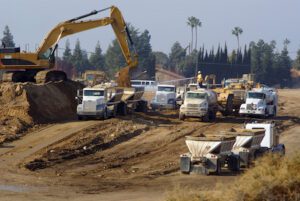
While the above prices provide a general idea, it’s essential to get detailed quotes tailored to your specific needs and location. Furthermore, always consider the total cost of ownership, which includes the purchase or rental price, as well as any ancillary costs like delivery, setup, maintenance, and utilities. With a clear picture of the expenses, you’ll be better equipped to make an informed decision about your office trailer needs.
Benefits of Investing in Office Trailers
Office trailers have steadily grown in popularity, and it’s not just due to their cost-effective nature. These versatile spaces offer a plethora of advantages to businesses, making them an appealing option for various industries and needs. Let’s dive into the benefits of investing in office trailers:
1. Flexibility and Mobility
Office trailers are inherently mobile. Whether your business is undergoing a relocation, or you have projects in various locations, these trailers can easily move with you. This portability ensures continuity of operations, even in transitional phases.
2. Quick Setup and Deployment
Unlike traditional brick-and-mortar constructions, office trailers are virtually turnkey solutions. Once delivered to the desired location, they’re ready for use within a short period, ensuring minimal disruption to your business operations.
3. Customizable Interiors
One of the standout features of office trailers is their adaptability. The interiors can be customized to serve multiple functions – from regular office spaces and meeting rooms to break areas or storage units. This ensures the trailer fits the exact requirements of your business.
4. Cost-Effective Solution
When comparing the costs associated with building or renting a permanent structure, office trailers often emerge as the more economical choice. Their affordability doesn’t compromise on quality or functionality, making them an attractive option for businesses looking to optimize expenses.
5. Scalability
As your business grows or project requirements change, office trailers can accommodate these shifts. Whether you need additional units or want to downsize, the modular nature of these trailers allows for easy scalability.
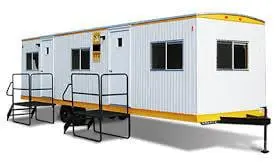
6. Minimal Site Impact
Office trailers have a reduced footprint, meaning they cause minimal disruption to the site they’re placed on. This is particularly beneficial for environmentally sensitive areas or sites where maintaining the natural landscape is crucial.
7. Enhanced Site Presence
For businesses such as construction or real estate development, having an on-site office establishes a professional presence. It’s a space where staff can convene, where plans can be reviewed, and where client meetings can be held, all without leaving the project site.
8. Temporary to Permanent Solutions
While many view office trailers as a temporary solution, their durability and quality mean they can serve as permanent office spaces if needed. With proper maintenance, these trailers can offer long-term value to businesses.
9. Reduced Downtime
For businesses undergoing renovations or those affected by unforeseen circumstances like natural disasters, office trailers provide an immediate solution, ensuring operations continue with minimal downtime.
10. Green Alternative
Repurposing office trailers or choosing those made from recycled materials offers a more sustainable solution. Moreover, their reduced energy consumption compared to larger structures contributes to a lower carbon footprint.
Investing in an office trailer is not just about saving money. It’s about flexibility, adaptability, and ensuring business continuity in various scenarios. With the array of benefits they offer, office trailers are indeed a valuable asset for businesses across industries.
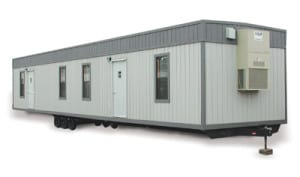
Top Features to Consider When Choosing an Office Trailer
Office trailers come in various sizes, designs, and configurations. When it’s time to select one for your business or project, several features can dictate its efficiency, comfort, and overall usability. Here’s a comprehensive guide to the top features you should consider when choosing the ideal office trailer:
1. Size and Layout
- Space Requirements: Determine the amount of space you need based on the number of occupants, furniture, and equipment. Consider future growth possibilities as well.
- Layout Flexibility: Look for trailers that offer customizable layouts or come in different configurations, so you can select one that aligns with your operational needs.
2. Insulation and Climate Control
- Thermal Insulation: Proper insulation ensures comfort in various weather conditions, reducing heating or cooling costs.
- HVAC Systems: A good office trailer should come equipped with an effective heating, ventilation, and air conditioning system suitable for the climate in your region.
3. Durability and Construction Quality
- Material Quality: Check the quality of the materials used for both the interior and exterior. High-grade materials ensure longevity and minimal maintenance.
- Weather Resistance: Ensure the trailer can withstand local weather conditions, be it intense sun, rain, or snow.
4. Accessibility
- Ramps and Steps: For inclusivity and safety, choose trailers that offer built-in or attachable ramps and steps.
- Door Width: Wider doors can facilitate the movement of large equipment or furniture and are also ADA compliant.
5. Security Features
- Locking Mechanisms: Secure doors and windows are crucial. Look for trailers that come equipped with robust locks or can support advanced security systems.
- Lighting: Adequate exterior lighting can deter potential break-ins and ensure safety during nighttime.
6. Connectivity and Power Outlets
- Electrical Outlets: Depending on the equipment and gadgets you’ll be using, ensure the trailer has ample electrical outlets.
- Pre-wired for Connectivity: Some office trailers come pre-wired for phone and internet connectivity, saving you installation time and hassle.

7. Windows and Natural Light
- Window Quality: Double-paned windows offer better insulation. Ensure they can open for ventilation and are equipped with quality latches.
- Natural Light: Adequate window placements can enhance the interior ambiance by allowing in natural light, which can also reduce energy costs during the day.
8. Interior Amenities
- Storage: Built-in cabinets, shelves, or closets can help organize documents and materials.
- Restroom Facilities: Depending on the location and duration of use, having an in-built restroom can be a significant advantage.
9. Transportation and Setup
- Skirting: This hides the wheels and gives the trailer a more permanent look while also protecting the underside.
- Ease of Transportation: Consider how easy it is to transport the trailer to different locations if mobility is a primary requirement.
10. Eco-friendly Features
- Energy-efficient Lighting: LED lighting or energy-saving fixtures can reduce electricity consumption.
- Green Materials: Some trailers use sustainable or recycled materials in their construction, aligning with eco-friendly business practices.
Selecting the right office trailer goes beyond just looking at the price tag. By considering the features listed above, you’ll ensure that your choice meets your business needs while offering comfort, security, and efficiency for its users.
Customization Possibilities
A notable advantage of office trailers is their adaptability. They are not just simple, stationary structures; they’re dynamic spaces that can be tailored to fit specific company needs. Let’s delve into how these customization options can enhance both function and brand representation.
Reflecting on Your Company Ethos
Every company has its unique brand language — the colors, designs, and vibes that distinguish it from competitors. An office trailer offers an excellent canvas for this. External facades can be painted or vinyl-wrapped in company colors. Inside, walls can adorn brand logos, mission statements, or inspiring quotes that echo the company’s core values. Even the layout can reflect a firm’s ethos. For instance, an open-plan layout can resonate with a brand promoting collaboration and transparency.
Furthermore, the interior decor can be aligned with the company’s industry. A tech start-up might favor a modern look with clean lines, whiteboards, and sleek furniture, while a creative agency could opt for vibrant hues, quirky furniture, and artsy decor.
Modular Components for Easy Reconfiguration
One of the standout features of office trailers is their modular nature. This means components are pre-manufactured in units, then assembled on-site. This modularity is a game-changer for businesses that anticipate changing needs.
For example, if a company starts with a small team but plans to expand, modular components can be added to enlarge the space. Walls can be moved or added to create additional rooms. As team dynamics change, the trailer can transition from individual offices to a more open-plan space or vice versa. Besides space reconfiguration, modularity also allows for the integration of advanced tech systems or specialized equipment. Need to set up a mini-conference room with audio-visual aids? Modular design can accommodate that.
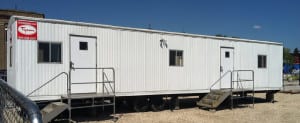
Office trailers are more than just mobile workspaces. They’re customizable units that can evolve with a company’s needs, ensuring a work environment that is both functional and representative of the brand’s identity.
Legal and Zoning Considerations
Navigating the maze of regulations, permits, and zoning laws can be a daunting task, especially when considering the use of office trailers. These mobile units, though versatile and efficient, come with their own set of legal stipulations that vary from region to region. Before investing in or placing an office trailer, it’s vital to be aware of these considerations to avoid any legal complications down the road.
Understanding Local Regulations
The first step in this process is to become familiar with local zoning ordinances. These laws dictate where certain structures, including office trailers, can be located. For instance, some areas might be zoned strictly for residential use, prohibiting the placement of commercial units like office trailers. There could also be restrictions in commercial zones regarding the duration an office trailer can stay in one place, especially if it’s deemed a temporary structure.
In addition to zoning, there are aesthetic or architectural guidelines in some regions. Even if office trailers are allowed, they might need to adhere to certain appearance standards so they don’t disrupt the visual continuity of an area.
Necessary Permits or Paperwork
Almost every jurisdiction will require some form of permit for the placement and use of an office trailer. The nature and cost of these permits vary. Common permits include:
- Land Use Permit: This is often the primary permit required, ensuring the land’s use aligns with zoning laws.
- Building Permit: Even though office trailers are pre-fabricated, some regions might still require a building permit, especially if there are additions or major modifications to the structure on-site.
- Utility Connections Permit: If the trailer needs to be hooked up to local utilities like water, sewage, or electricity, additional permits may be necessary.
- Occupancy Permit: Before the trailer can be used, an inspection might be required to ensure it’s safe for occupation. This might involve checking emergency exits, fire safety measures, and the structural integrity of the unit.
It’s always a wise move to consult with local officials or a legal professional familiar with local property laws when considering an office trailer. They can provide guidance on the required permits and potential restrictions.
While office trailers offer incredible flexibility and convenience, it’s essential to approach their use with a thorough understanding of the legal landscape. Doing the due diligence upfront can save time, money, and potential legal headaches in the future.
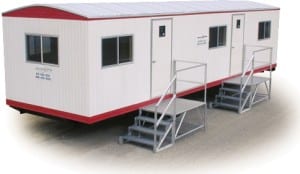
Maintenance and Longevity of Your Office Trailer
An office trailer’s appeal lies not just in its flexibility and affordability, but also in its potential for long-term use. Like any structure, however, it requires regular maintenance to remain functional and extend its lifespan. Here’s a guide to ensuring your office trailer stands the test of time and continues to provide an efficient workspace for years to come.
How to Maintain an Office Trailer for Long-Term Use
- Regular Inspections: Set a schedule to inspect your office trailer periodically. Check both the interior and exterior, looking for any signs of damage or wear. This proactive approach helps you address minor issues before they become major problems.
- Cleanliness: Keeping the trailer clean is fundamental. Regular cleaning prevents mold, mildew, and pest infestations. Ensure the flooring, especially carpeted areas, is vacuumed regularly, and wipe down surfaces to prevent dust accumulation.
- Climate Control: Proper ventilation and temperature control can prevent moisture buildup, which can lead to mold growth and structural damage. Ensure your HVAC systems are in working order and consider using dehumidifiers in particularly damp climates.
- Roof Maintenance: The roof of an office trailer is its first line of defense against weather elements. Check for leaks, cracks, or pooled water, and ensure seals and seams are intact.
- Plumbing and Electrical Systems: Regularly inspect the plumbing to prevent leaks and potential water damage. Electrical systems should also be checked to ensure they’re safely functioning, with no frayed wires or overloaded circuits.

Common Wear and Tear Issues and Solutions
- Floor Wear: High traffic areas can show signs of wear over time. Consider using protective mats or changing the flooring to more durable materials if wear becomes noticeable.
- Door and Window Seals: With frequent use, the seals around doors and windows can degrade. Regularly check these areas and replace seals as necessary to prevent drafts and moisture intrusion.
- Exterior Paint: The paint on the exterior can chip or fade due to weather exposure. Periodic repainting or touch-ups can keep the trailer looking fresh and provide an added layer of protection.
- Rust and Corrosion: If your office trailer is made of metal components, rust can be an issue, especially in humid climates. Regularly check for signs of rust and address them promptly, either by using rust-resistant paint or consulting with a professional.
- Skirting Damage: If your trailer has skirting, it can become damaged from various elements. Ensure it remains intact to provide proper insulation and protect the underside of the trailer.
By being vigilant and proactive, office trailer owners can ensure their investment remains in top condition. Remember, the goal is not just to fix problems but to prevent them. With regular maintenance and prompt attention to wear and tear issues, an office trailer can serve as a dependable and lasting workspace solution.

Leave a Reply